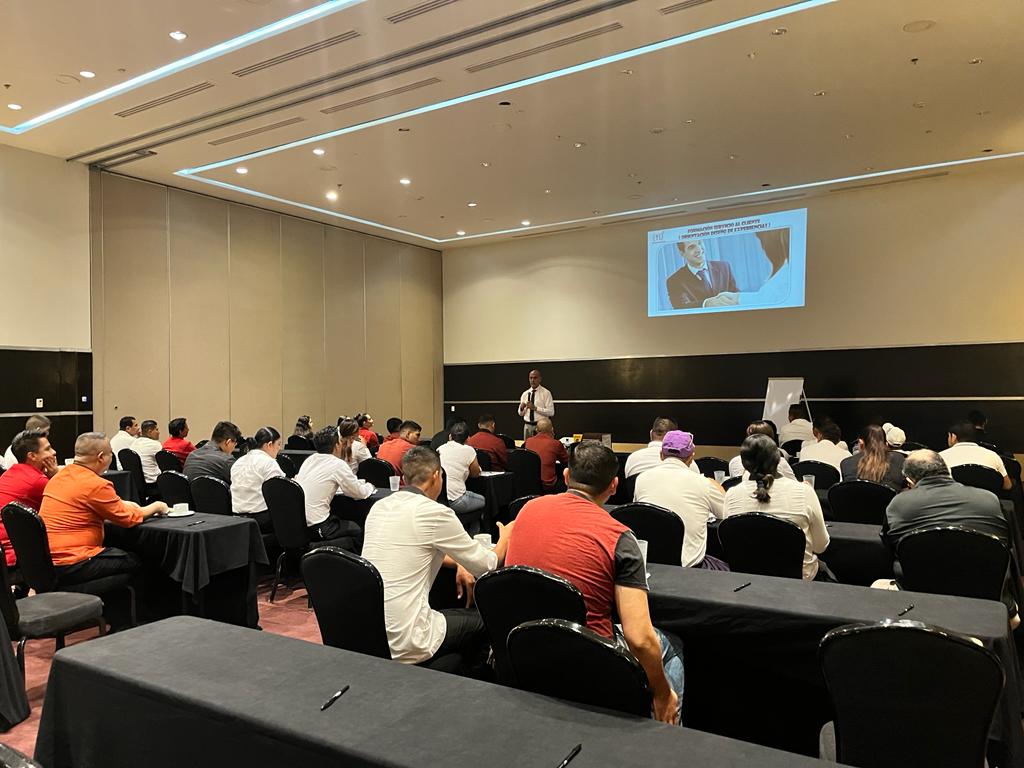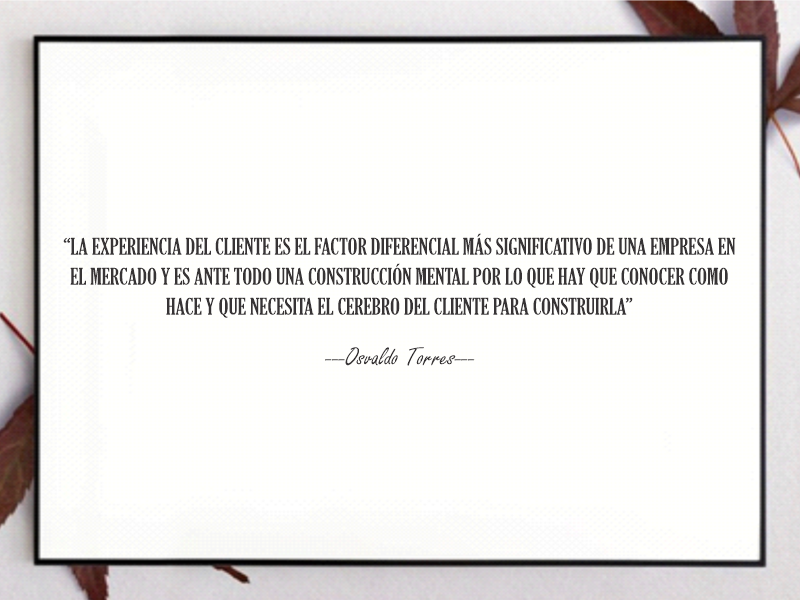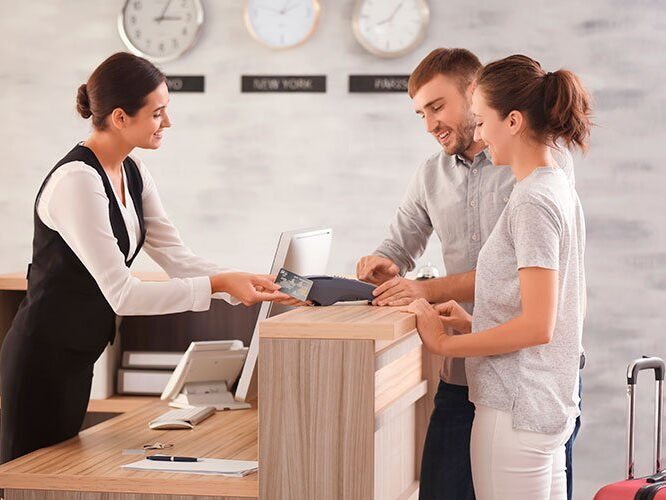Objectives:
1-Sensitize the participants with information vectors of the Neurohospitality to build a basic experiential knowledge to be able to transform the product and service that each worker offers to their clients in an unforgettable experience and conditioning of the client's loyalty to the company.
2-Modulate the care behavior of the participants towards excellence in the service they offer their clients.
3-Promote the personal and professional development of the participants through the incorporation of the knowledge acquired.
4-Increase the added value of the services offered to customers in a company and turn the moment of truth into a differential competitive tool for companies.
Scope:
Aimed at all employees in direct contact with hotel customers. The number of participants is determined by the Hotel.
Duration:
8/9 days distributed in three phases:
1st Phase: Mystery Guest Service. Servicio de Mistery Guest.
This phase lasts one day, where the areas of experiential opportunity that will be taken to reinforce and personalize subsequent learning are detected. A report is prepared on the experiential opportunity areas detected.
2nd Phase: Theoretical-Practical Learning.
This phase lasts for 5 consecutive days divided into two sessions of 3:30 hours (morning session for afternoon shift workers and afternoon session for morning shift workers).
Total hours per session 16 hours.
3rd Phase: Coaching on the Job with the participating teams.
This phase lasts two or three days (depending on the number of work teams that participate). The trainer is integrated into the operation of each work team (wearing its uniform) to detect operational experiential opportunity areas and possible knots or barriers that prevent experiential design in each sector. A report is prepared on the experiential opportunity areas detected.
...
Modality:
In Company
1-AUTOREFLECTION AS HOTELIERS.

1 – REFLEXIÓN SOBRE EL YO HOTELERO.
Space for self-reflection about the intentions, objectives and expectations of working in the Hotel industry. The intelligence of knowing how to be, knowing how to be, knowing how to do and knowing how to achieve as a hotelier.
Our clients: the most important source of possibilities for hoteliers. Contact with our customers, the source of the greatest change in our brains. How to use the law of attraction to obtain benefits as hoteliers? Building our personal brand as hoteliers. The values and skills to work in customer service, among others ... entre otros más…
2- The CLIENT BEFORE HIS ARRIVAL.
Definition of client. Definition of luxury service. The client as an observer. Application of the 1st principle of NLP to customer service. The super power of the customer's senses in the personalization of the service. The hotel product and service as a construction in the client's mind. Customer sensory. The sensorialization of the product and service. The management of the client's history, among others… entre otros más…
3-THE CUSTOMER UPON ARRIVAL.
Reading the client through the activation of “our personal radar”. The commitment on reading the client. The three fundamental characteristics of servuction or moment of truth with the client. Contact with the client as a development interaction. Neurobiology of the first impression. Biologically active stimuli in the first impression with the client. The attentional salience of our stimuli when meeting the client. The labels in the first impression and its difficulty to change or eliminate them, among others... entre otros más…
4-THE CUSTOMER DURING THEIR STAY
The art of conversation with the client. Building trust through verbal language. The linguistic acts. Designing development conversations with clients. The art of asking. Tips before asking the customer something. Phrases and questions that call the attention of the client's brain. What we should avoid telling the client. Verbal stimuli to avoid when talking to the client. Determinants of an effective conversation. Closing conversations or opening possibilities. The conversational skills of the hotelier, among others… entre otros más…
5-THE CLIENT AS AN EMOTIONAL-COGNITIVE AND BEHAVIORAL BEING
The key question of a hotelier for his client. The customer's ability to feel and adapt to the product and service that is being offered. Reading the real state of the client. Accompaniment of the client to the ideal state of balance . Client's feelings of balance and imbalance. Managing customer needs. The time factor in managing customer needs. Need versus need satisfiers, its influence on the product and service. The management of the pleasure of the client and the hotelier through the product and the service. Anthropology of the smile, among others…. entre otros más..
6-MANAGEMENT OF CUSTOMER DISSATISFACTION (COMPLAIN)
Customer dissatisfaction as a breaking point. Constitutive breaking points according to culture. Detection of dissatisfaction triggers. The emotions involved in dissatisfaction. Brain control of anger, or rage. The emotional kidnapping of the client during facing a dissatisfaction. The perception of time during the emotional kidnapping. Flowchart of customer dissatisfaction management, among others… entre otros más…
7-THE ART OF THE CUSTOMER RELATIONSHIP
Is the customer always right? Client memories as reference systems. The impact of emotions in the construction of an unforgettable experience. The consolidation of memory. The meaning and value of the relationship with the customer. The emotional intelligence of the hotelier in the success of the relationship with the client. Creating the emotional profile of the client. The management of emotions. The hotelier as an emotional reader, among others… The learning incorporates the luxury service standards contained in AAA, Leading Hotels of the World and Forbes Reccomended plus the standards of the Neurohospitality concept. entre otros más…
The learning incorporates the luxury service standards contained in AAA, Leading Hotels of the World and Forbes Reccomended plus the standards of the Neurohotel industry.
FOR MORE INFORMATION ABOUT THE REST OF THE CONTENT OF THE MODULES, COSTS AND CONTRACT CONDITIONS, YOU CAN CONTACT US BY CLICKING HERE CLICK AQUÍ


